
Speakers' Biographies
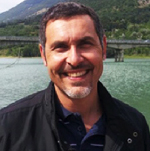 |
Cristian Capelli U. Oxford, United Kingdom |
|
| Cristian Capelli obtained his PhD in Forensic Genetics at the Institute of Legal Medicine of the Univesità Cattolica del S. Cuore in Rome. He has worked in the laboratories of Svante Paabo and David Goldstein and since 2006 he is an Associate Professor in Human Evolution at the Department of Zoology of the University of Oxford. His research focuses on human evolution, with a particular attention to the processes (cultural and historical) that have shaped the distribution of genetic variation across human populations. Current projects address the historical events that led to the peopling of the Mediterranean region and the European continent, and the pattern of migration and admixture in Sub-Saharan Africa. |
||
| .................................................................................................................................................................................................................................. | ||
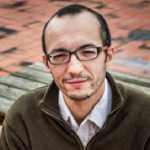 |
Lounès Chikhi IGC, Lisbon, Portugal & CNRS, Toulouse, France |
|
| Lounès Chikhi obtained his PhD in Population Genetics at Université Pierre et Marie Curie. He is currently based at the Université Paul Sabatier in Toulouse, France, and also at the Instituto Gulbenkian de Ciência in Oeiras, Portugal, where he runs the Population and Conservation Genetics Group (PCG). The PCG carries out research in the area of population genetics with a focus on conservation and human population genetics. In particular the group is interested in understanding the statistical properties of genetic data in natural or managed populations/breeds in order to determine when and how genetic data can be used to make statements about the populations’ recent evolutionary history. The group develops field and laboratory work together with data analysis and computer simulations. They have applied these methods to a wide range of species but in the last few years their main focus has been on endangered species from Madagascar and Borneo, and, for human populations, on the Neolithic transition. |
||
| .................................................................................................................................................................................................................................. | ||
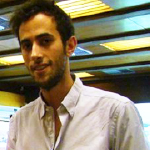 |
João Alves U. Vigo, Spain |
|
| João M. Alves graduated in Applied Biology in 2008 from the University of Minho, Portugal and in 2009 he was awarded with a research fellowship at the Instituto Gulbenkian de Ciência, Portugal. He obtained his PhD in 2014 by the Institute of Biomedical Sciences (ICBAS), Porto, Portugal working on the evolutionary history of chromosomal rearrangements. Currently he is a postdoctoral researcher at David Posada’s group at the University of Vigo, Spain, working on NGS data analysis. | ||
| .................................................................................................................................................................................................................................. | ||
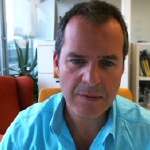 |
David Posada U. Vigo, Spain |
|
| David Posada obtained his PhD in Zoology in the Brigham Young University (Utah, USA). He has worked in the University of Oxford (UK), Variagenics Inc and MIT (Boston, USA) and then he got a Full Professor position at the Department of Biochemistry,
Genetics and Immunology of the University of Vigo (Spain). His research involves population genetics, phylogenetics and phylogenomics, evolutionary biology and bioinformatics. In particular, he is interested in theoretical, methodological and empirical aspects of the evolutionary analysis of genes and genomes. Currently, he is very interested in the evolutionary and population genetics analysis of cancer tumor cells, a topic where he recently obtained an ERC Consolidator Grant. |
||
| .................................................................................................................................................................................................................................. | ||
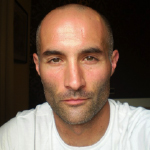 |
Marcos Pérez-Losada George Washington University, USA & CIBIO-InBIO, Porto, Portugal |
|
| Marcos Pérez-Losada obtained his PhD in Genetics in the University of Vigo (Spain). He has worked in the University of Hull (UK), Brigham Young University (Utah, USA), GENOMA LLC (USA) and then he obtained an Assistant Research Professor position at both the George Washington University (USA) and CIBIO (Portugal). His research involves invertebrate biodiversity, dynamics of human infectious diseases, bacterial genomics, HIV and host-microbe interactions, but also the evaluation of methods for phylogenetic and population genetic analysis and data types to study evolutionary processes at both the species and population levels. |
||
| .................................................................................................................................................................................................................................. | ||
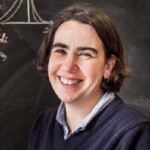 |
Isabel Gordo IGC, Lisbon, Portugal |
|
| Isabel Gordo obtained her PhD in Evolutionary Biology at the University of Edinburgh, UK working with Brian Charlesworth. Currently she is the group leader of Evolutionary Biology group at Instituto Gulbenkian de Ciência in Oeiras, Portugal. The lab combines both theoretical and empirical work with the aim of understanding the major forces that shape variation in populations. They use E. coli as a model organism to test theoretical predictions about the genetics of adaptation in the context of environmental changes due to abiotic and biotic factors. The main topics of current research are: evolution of antibiotic resistance caused by chromosomal mutations, adaptation to cells of the innate immune system, transition of commensalism to pathogenesis and evolution in the gut microbiota. | ||
| .................................................................................................................................................................................................................................. | ||
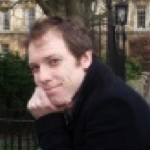 |
Don Conrad Washington University in St. Louis, USA |
|
| Don Conrad completed his PhD with Jonathan Pritchard at University of Chicago, and a post-doc with Matthew Hurles at the Wellcome Trust Sanger Institute, before joining the Washington University in St. Louis as an assistant professor in 2011. He is an active member of www.genomesunzipped.org, a group of professionals providing perspectives and tools for personal genomics. His main research interests are reproductive biology and the development of computational tools for genome analysis. He is one of the founders of the GEMINI consortium, currently funded by the National Institutes of Health, which aims at identifying the genetic architecture of male infertility in populations of European ancestry. | ||
| .................................................................................................................................................................................................................................. | ||
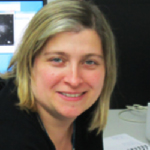 |
Isabel Alonso UniGene, i3S, Porto, Portugal |
|
| Isabel Alonso obtained her PhD in Biomedical Sciences, at Institute de Ciências Biomédicas Abel Salazar (ICBAS), University of Porto, in 2006. During the PhD, she focused on identifying mutations in families with rare Spinocerebellar Ataxias (SCAs), as well as in the molecular and behavioural study of a mouse model with a major impact on the knowledge about these disorders and, in particular, on the role of calcium deregulation on cognitive function. Following two years of postdoc she obtained a research position at Instituto de Biologia Molecular e Celular (IBMC), Porto, Portugal, under the Ciência 2008 program which allowed her to start independent research lines at UnIGENe and tackle scientific topics not being addressed, as the search for genetic modifiers by the study of patients and C. elegans models. Currently Isabel is an Assistant Researcher at IBMC/i3S, Porto, Portugal. | ||
| .................................................................................................................................................................................................................................. | ||
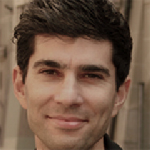 |
Pedro Ferreira IPATIMUP/ i3S, Porto, Portugal |
|
| Pedro G. Ferreira completed his PhD in Artificial Intelligence from the University of Minho in November 2007. From 2008 to 2012, he was a Postdoctoral Fellow at the Bioinformatics and Genomics Laboratory, Center for Genomic Regulation (CRG), Barcelona. During this period he worked extensively with next generation sequencing (NGS) data. He collaborated with several groups in the CRG and the University Pompeu Fabra and several international consortia. In November 2012, he joined as a Postdoctoral Fellow the Functional Population Genomics and Genetics of Complex Traits group, School of Medicine, University of Geneva. His research was focused on genomics for personalized health. During his two postdocs, he was or is involved in four major international consortia: ENCODE, ICGC-CLL, GEUVADIS and GTEx. In August 2014, he joined the start-up company Coimbra Genomics as a senior bioinformatics specialist. He worked in the design and development of clinical decision support systems for personalized medicine. In May 2015 he joined the Expression Regulation in Cancer group at IPATIMUP as an FCT Investigator ‘Starting grant’. His main research focus is the development of information systems to interpret personal genomics data for clinical diagnosis and precision medicine. | ||
| .................................................................................................................................................................................................................................. | ||
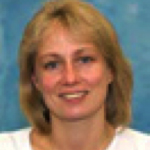 |
Nicola Gray U. of Edinburgh, United Kingdom |
|
| Nicola Gray completed her PhD at the European Molecular Biology Laboratory in Heidelberg and was awarded a PhD by the University of Glasgow. She then carried out postdoctoral research at the University of Wisconsin, Madison, where she developed an interest in translational regulation during early development. In 2000 she became a Group Leader at the MRC Human Genetics Unit in Edinburgh and in 2008 she moved her laboratory to the MRC Human Reproductive Sciences Unit where she remains associated with the University of Edinburgh. | ||
| .................................................................................................................................................................................................................................. | ||
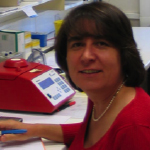 |
Luísa Romão INSA, Lisbon, Portugal |
|
| Luísa Romão developed research work as a graduate student in the University of Pennsylvania, School of Medicine, Philadelphia USA and obtained a PhD in Molecular Genetics by the Faculdade de Ciências e Tecnologia, Universidade Nova de Lisboa. She is currently the Head of the mRNA Metabolism Group of the Human Genetics Department at Instituto Nacional de Saúde Doutor Ricardo Jorge and Invited Professor at Faculdade de Ciências of Universidade de Lisboa (FCUL). She has been involved in studying mechanisms of post-transcriptional control of gene expression in health and disease. Half of the research in the laboratory focuses on nonsense-mediated mRNA decay (NMD), which likely evolved to safeguard cells from potentially deleterious proteins produced as a consequence of routine mistakes in gene expression. Her data has been crucial to clarify the interplay between mRNA translation, PTC definition and NMD, in order to understand the mechanisms of PTC-associated diseases. The other half of her research focuses on the molecular basis of the control of protein synthesis in human cells and its importance in diseases such as cancer, diabetes, and neurological diseases. | ||
| .................................................................................................................................................................................................................................. | ||
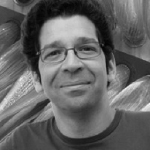 |
Rui Martinho U. Algarve, Portugal |
|
| Rui Martinho obtained his PhD in Biology at the University of Sussex, UK. He did a postdoc in the laboratory of Ruth Lehmann, HHMI-NYU Medical Center, USA and from 2003 to 2006 he was an associate in the Howard Hughes Medical Institute unit at New York University School of Medicine (New york, USA). Fom 2006 to 2011 he was an independent investigator at Instituto Gulbenkian de Ciência (Oeiras, Portugal) and in 2011 became an Assistant Professor at University of Algarve, Portugal. His main research interest is to take advantage of Drosophila melanogaster as a model system to study germ-line development, tissue morphogenesis and cell division during development. Since tumorigenesis is frequently associated with loss of tissue integrity and misregulation of cell proliferation, this work is expected to give a contribution into a better understanding of molecular and cellular processes associated with the onset and development of cancer. He also leads a private research initiative – Thelial Technologies (Screen for novel cancer chemotherapy drugs using Drosophila melanogaster as a model system). | ||
| .................................................................................................................................................................................................................................. | ||
Address: Rua Alfredo Allen, 208 | 4200-135 Porto, Portugal
Phone: +351 220 408 800 | Email: portgen@ipatimup.pt